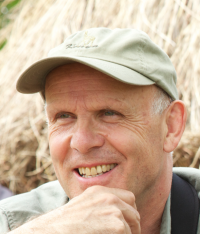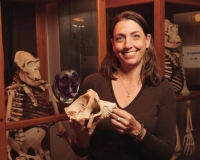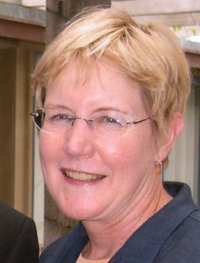The Role of Hunting in Anthropogeny
Biographical Sketches: Co-Chairs
UC San Diego
Jim Moore is an emeritus associate professor of the Department of Anthropology at UC San Diego. His research is on the behavioral ecology of modern primates, with specific interest in the use of insights gained from such work to aid our understanding of Plio-Pleistocene hominins. For most of his career, this work has been carried out on savanna-living chimpanzees at Ugalla in western Tanzania, as a member of the Ugalla Primate Project (now https://www.gmerc.org/). He also has written extensively about the relationship between demography and behavior (specifically, nepotism and dispersal) in primates.
Ugalla is one of the driest and most open sites at which chimpanzees live, and is one of only three active savanna chimpanzee study sites. It has a full complement of predators (lion, leopard, hyena and wild dog) as well as elephant, zebra, roan and at least seven other species of primate. The main study community has over 60 individuals; unfortunately (but interestingly) the prevalence of SIVcpz (the chimpanzee version of HIV) is about 30%. Population density is less than 1/20th of forested sites like Gombe or Kibale.
Understanding how chimpanzee behavior and social structure is influenced by adaptation to savanna life (either directly by the distribution of resources and predators, or indirectly via the effects of population density) can help us understand the scope of chimpanzee biocultural adaptation, as well as help generate, refine, and hopefully test models of early hominin evolution in very similar savanna-woodland environments.
Harvard University
Richard Wrangham is the Ruth Moore Professor of Biological Anthropology at Harvard University, where he has taught since 1989. His major interests are chimpanzee and human evolutionary ecology, the evolutionary dynamics of violence, and ape conservation. He received his Ph.D. in Zoology from Cambridge University in 1975, was a Research Fellow at King’s College (Cambridge) from 1977 to 1980, and taught at the Department of Anthropology at the University of Michigan (Ann Arbor) from 1981-1989. Since 1987 he has studied wild chimpanzee behavior in Kibale National Park, Uganda. His most recent book is Catching Fire: How Cooking Made Us Human (Basic Books, 2009)
Biographical Sketches: Speakers
Pennsylvania State University
Rebecca Bliege Bird is an ecological anthropologist interested in the socioecology of subsistence in small scale societies. She pursues such topics as the gender division of labor in hunting and gathering, cooperation, costly signaling, indigenous conservation/land management, and fire ecology, drawing on theory, models, and methods from behavioral ecology and landscape ecology to answer questions about how local social contexts influence economic decision-making and how such decisions impact local ecological communities.
University of Nevada, Las Vegas
Alyssa Crittenden is a human behavioral ecologist and nutritional anthropologist who has worked with the Hadza hunter-gatherers of Tanzania since 2004. Her primary research interest is the study of the evolution of human behaviors as a function of socioecological context. The majority of her work explores the intersection of diet, life history, and sociality during human evolution. Her research foci include: evolution of the human diet; evolution of childhood; children’s foraging and food sharing; nutritional and behavioral correlates of cooperative breeding; life history theory. She is currently Vice Provost for Graduate Education; Dean of the Graduate College; and Professor of Anthropology at University of Nevada, Las Vegas and serves on the CARTA External Advisory Board.
UC San Diego
Pascal Gagneux is CARTA's Executive Co-Director, a Professor of Pathology and Anthropology, and the Department Chair of Anthropology at UC San Diego. He is interested in the evolutionary mechanisms responsible for generating and maintaining primate molecular diversity. The Gagneux laboratory studies cell-surface molecules in closely related primates species. His focus is on glycans, the oligosaccharides attached to glycolipids and glycoproteins of the surfaces of every cell and also secreted into the extra-cellular matrix. Gagneux's laboratory is exploring the roles of molecular diversity in protecting populations from pathogens as well as potential consequences for reproductive compatibility. Dr. Gagneux’s interest is in how glycan evolution is shaped by constraints from endogenous biochemistry and exogenous, pathogen-mediated natural selection, but could also have consequences for sexual selection. Dr. Gagneux has studied the behavioral ecology of wild chimpanzees in the Taï Forest, Ivory Coast, population genetics of West African chimpanzees, and differences in sialic acid biology between humans and great apes with special consideration of their differing pathogen regimes. In 2011, while Associate Director of CARTA, Dr. Gagneux helped to establish a graduate specialization in Anthropogeny at UC San Diego. This wholly unique graduate specialization is offered through eight participating graduate programs in the social and natural sciences at UC San Diego.
Arizona State University
Ian Gilby is an Assistant Professor in the School of Human Evolution and Social Change at Arizona State University. He has studied the behavioral ecology of wild chimpanzees since 1997. Gilby's main research interests are cooperative hunting, meat sharing, and adult male dominance strategies. He is co-director of the Gombe Chimpanzee Database, which contains over five decades of detailed behavioral, ecological, and demographic data from the long-term study of two chimpanzee communities in Gombe National Park, Tanzania
Smithsonian Institution
Briana Pobiner is an Associate Research Professor of Anthropology at the George Washington University. As a paleoanthropologist, her research centers on the evolution of human diet (with a focus on the ecology of meat-eating), but has included topics as diverse as cannibalism in the Cook Islands and chimpanzee carnivory. She has done fieldwork in Kenya, Tanzania, South Africa, and Indonesia. Her favorite field moments include falling asleep in a tent in the Serengeti in Tanzania while listening to the distant whoops of hyenas, watching a pride of lions eat a zebra carcass on the Kenyan equator, and discovering fossil bones that were last touched, butchered and eaten by one of her 1.5-million-year-old ancestors. Pobiner joined the Smithsonian’s National Museum of Natural History in 2005, where in addition to continuing her active field, laboratory, and experimental research programs, she leads the Human Origins Program’s education and outreach efforts. Pobiner has also more recently developed a research program in evolution education and science communication.
Texas State University
Jill Pruetz is a Professor of Anthropology at Texas State University specializing in Biological Anthropology. She received a Bachelor's in Anthropology and another in Sociology at Texas State University (then Southwest Texas State) in 1989. Her Ph.D. was awarded in 1999 in Anthropology at the University of Illinois at Urbana-Champaign. She studied vervet and patas monkey socioecology for her dissertation research, focusing on the influence that food availability had on female primate competition and dominance. Pruetz held a Postdoctoral position at Miami University (of Ohio) from 1999-2000, where she focused on assessing the presence and distribution of chimpanzees in savanna habitats in Senegal. Since 2001, Pruetz has been the Principal Investigator of the Fongoli Savanna Chimpanzee Project in Senegal, where she has focused on the environmental pressures that influences ape behavior there and how such behavior differs from chimpanzees living in forested environments. She uses these findings to inform our knowledge of early hominin behavioral ecology. Pruetz has studied primates in Kenya, Nicaragua, Panama, Costa Rica and Peru, as well as Senegal, and she leads field schools to Costa Rica to the El Zota Biological Field School, which she helped initiate in 1999. She is also the Director of the non-profit (501c3) organization, Neighbor Ape, which seeks to conserve chimpanzees in Senegal but also provides for the well-being of people that live alongside them.
UC San Diego
Margaret Schoeninger is Distinguished Professor Emerita of Anthropology at UC San Diego, a Research Archaeologist in the Glenn Black Laboratory of Archaeology at Indiana University, and Emerita Co-Director of CARTA. She has done fieldwork in North America, Mexico, Pakistan, India, Kenya, and Tanzania as well as laboratory research on carbon, nitrogen, and oxygen stable isotope ratio analysis in biological tissues and food component analysis of traditional foods. Her major interest is in the evolution of human diet particularly as it informs our understanding of the appearance and evolution of the human lineage.
UC San Diego School of Medicine
Ajit Varki is a Distinguished Professor of Medicine and Cellular & Molecular Medicine, Emeritus Co-Director of CARTA, Emeritus Co-Director of the Glycobiology Research and Training Center at UC San Diego, and Adjunct Professor at the Salk Institute. He received basic training in physiology, medicine, biology, and biochemistry at the Christian Medical College (CMC), Vellore, The University of Nebraska, and Washington University in St. Louis. He also has formal training and board certification in internal medicine, hematology, and oncology. Varki is the executive editor of Essentials of Glycobiology (Cold Spring Harbor Press, 4th Edition, 2022) and is recipient of a MERIT award from the NIH, and an American Cancer Society Faculty Research Award. Honorific elections include the American Academy of Arts and Sciences, the National Academy of Medicine, the American Society for Clinical Investigation, and the Association of American Physicians. He is also recipient of the three highest honors in his field, the Karl Meyer Award of the Society for Glycobiology, the International Glycoconjugate Organization Award and the Rosalind Kornfeld Award for Lifetime Achievement in Glycobiology. He is recognized for creating the first major open access research journal (J. Clin. Invest., 1996) as well as the first major open access textbook (Essentials of Glycobiology, 2009). He was honored with the Old Cottonian of Eminence Award at the 150th Anniversary of Bishop Cotton Boys School, Bangalore, India, (2015) as well as a Distinguished Faculty Medal and Oration at his medical school alma mater, CMC, Vellore. Significant past appointments include: Co-Head, UC San Diego Division of Hematology-Oncology; President of the Society for Glycobiology; Editor-in-Chief of the Journal of Clinical Investigation; Interim Director of the UC San Diego Cancer Center, President of the American Society for Clinical Investigation, and UC San Diego Associate Dean for Physician-Scientist Training. Varki's research interests are focused on a family of cell surface sugars called sialic acids, and their roles in biology, evolution and disease. Currently, active projects are relevant to the roles of sialic acids in microbial infectivity, the regulation of the immune response, the progression and spread of tumors, aging, and unique aspects of human evolution. His group is particularly intrigued to find multiple interrelated differences in sialic acid biology between humans and our closest evolutionary cousins, the "great apes." These differences are a signature of the events that occurred during the last few million years of human evolution, and appear to be relevant to understanding several aspects of the current human condition, both in health and disease. Varki’s book, Denial (Twelve, Hachette Books, 2013), explores a novel "Mind Over Reality Transition” (MORT) theory that denying reality and personal mortality was a key step in allowing the emergence of a full theory of mind, and in the origin of our species.
Yale University
David Watts is a Biological Anthropologist and a Professor in the Anthropology Department at Yale University. He received a B.A. from the University of Pennsylvania and M.A. and Ph.D. degrees from the University of Chicago. His master’s research was n white-faced capuchin monkeys in Panama and his doctoral research was on the behavioral ecology of mountain gorillas. He spent more than five years studying mountain gorilla behavior, ecology, and life history strategies at the Karisoke Research Centre in Rwanda, including serving as Karisoke Director in 1986-87. Since 1993 he has pursued field research on chimpanzee behavior, ecology, and demography at Ngogo, in Kibale National Park, Uganda. The Ngogo chimpanzee community is by far the largest yet known in the wild and has provided much valuable comparative data on hunting and meat eating, among other topics. He is a Co-Director of the Ngogo Chimpanzee Project along with John Mitani (University of Michigan) and Kevin Langergraber (Arizona State University). He has also taught at Roosevelt University, the University of Michigan, and Duke University.












